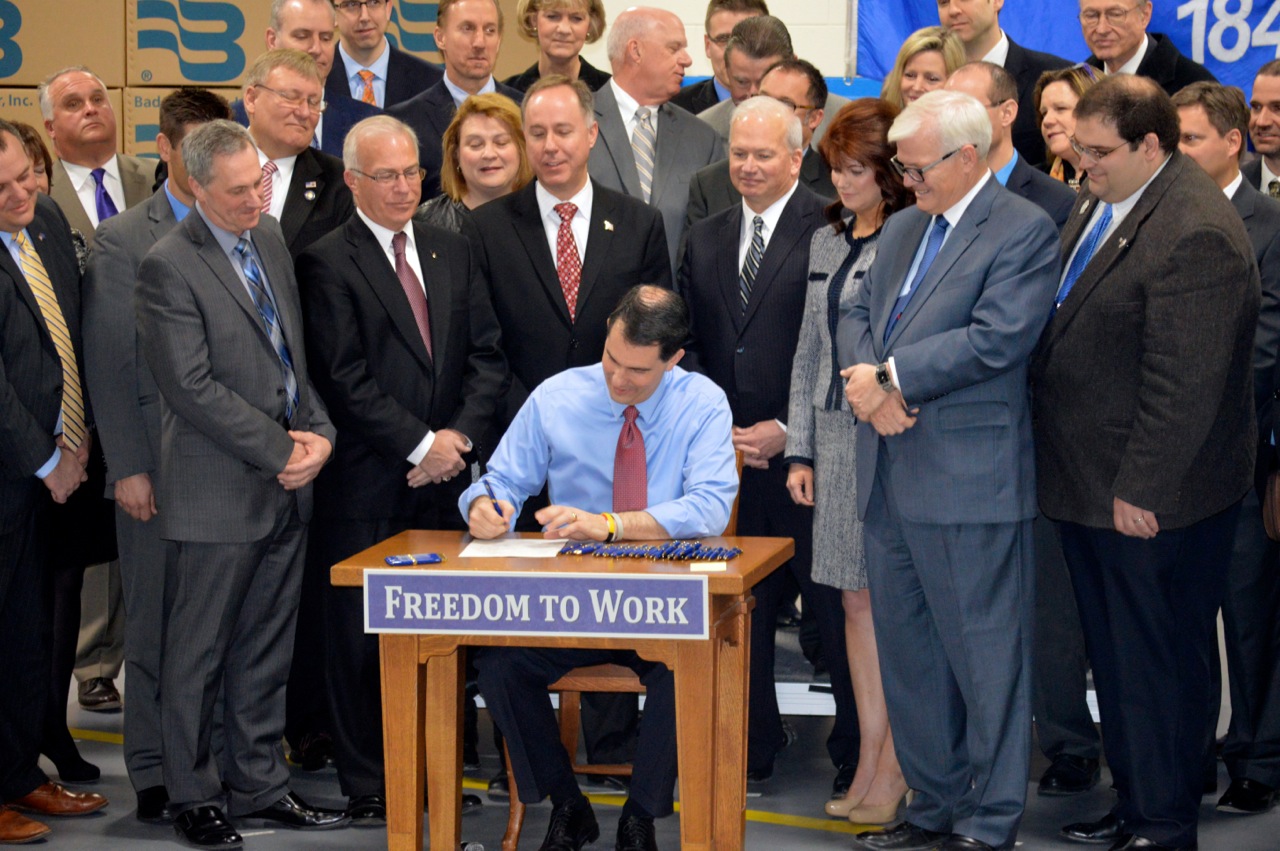Wisconsin’s Rotten Return on Federal Taxes Paid
New report shows we’re the fourth worst state in federal spending received. Walker’s policies don’t help.
A new report by the Wisconsin Taxpayers Alliance goes into great detail — none of it good — on how poorly Wisconsin does in federal dollars returned to this state. Wisconsin ranks 47th among the states, with $8,339 per state resident received in federal spending, compared to an average of $10,033 for residents of all states. Historically, Wisconsin is a “donor state,” getting less than 90 cents back for every dollar in federal taxes our residents pay.
WisTax, a not-for-profit that advocates for lower taxes and spending in this state, looks at this issue because more federal money received generally means a state can rely less on its own taxing. “State and local governments can fund services with either the taxes they levy or the fees they charge. Or, they can use federal aid to replace some of the monies generated at home,” the report notes. Federal spending on education, health care, transportation, etc., can replace some dollars spent by a state.
Two other states “illustrate the impact federal assistance can have on state-local taxes,” the report notes. “Pennsylvania received $175 more per capita from the federal government than Wisconsin, and its state-local taxes were $163 per capita (3.5%) lower. West Virginia claimed $768 per capita more in federal aid than Wisconsin, and its taxes were $833 per capita (18.0%) lower.”
Federal dollars can also put more money in the pockets of citizens, which then circulates in the Wisconsin economy, driving growth. For instance, “every $5 in new SNAP benefits [federal food stamps] generates as much as $9 of economic activity,” as the U.S. Department of Agriculture has estimated. An increase in Social Security or in wages paid to military personnel located in this state leads to more consumer spending locally by recipients.
Certain factors have historically combined to constrain Wisconsin’s ability to secure federal dollars. Wisconsin has less military installations and military personnel, and less federal employees overall than the average state. And despite being a heavy manufacturing state, Wisconsin ranks below average in products purchased by the Defense Department and other federal agencies. “At $563 per capita, federal procurement here was less than half the U.S. average ($1,298) and 36th highest among the states,” the report notes.
But Wisconsin has long been a state whose citizens aren’t very concerned about whether their federal representatives bring home the bacon, as I’ve written. With a few exceptions, both Democratic and Republican representatives and senators haven’t worked hard to deliver for their district. Current Republican U.S. Senator Ron Johnson hasn’t made it a priority, but don’t expect his Democratic opponent Russ Feingold to make this a campaign issue, since Feingold, during his 18 years as a senator, never worried much about snagging federal dollars.
Governors can also make it a priority to seek federal grants, and Democrat Jim Doyle had great success when it came to the federal stimulus plan to revive the economy after the Great Recession. “Wisconsin benefited more than most states from stimulus spending,” the report notes. “In 2009, per capita federal spending rose 13.5% nationally but 30.2% in Wisconsin. Only Connecticut (35.7%) had a larger increase…Consequently, Wisconsin captured $1.36 in federal expenditures for every $1 in taxes paid in 2009, and that rose to $1.44 in 2010.”
During those two years, Wisconsin suddenly saw its job growth rise faster than the national average and unemployment decline faster than nationally, as our Data Wonk columnist Bruce Thompson has documented.
But Scott Walker, then the Milwaukee County Executive, and preparing a run for governor, blasted Doyle for accepting federal stimulus funds, and declared he would not seek any grants. Given the county’s huge need for money to improve its deteriorating parks and declining public transit system, this was a huge opportunity for the county. As Tim Sheehy, president of the Metropolitan Milwaukee Association of Commerce, was quoted at the time, “if Washington opens the spigot, we ought to be there with a bucket.”
In his book, Unintimidated, Walker argued that the “‘free’ money from Washington wasn’t free.” He noted for instance, that “once the highways were built… the stimulus funds would disappear and Wisconsin taxpayers would be left… to maintain the new roads.”
Of course, that’s true of any new highway built in the state, and is why the state should avoid overbuilding. But if you’re going to build, and clearly Walker favors more highways, why not pay for it with federal spending that your state’s taxpayers helped underwrite?
Following Walker’s philosophy, companies like Oshkosh Truck wouldn’t bid for federal contracts or non-profits like the Boys and Girls Club wouldn’t bid for federal grants because the spigot might some day get turned off. Not surprisingly, they don’t see it that way.
Walker rejected federal funding to expand Medicaid in Wisconsin, which has lost the state some $500 million. Walker argued that the federal government could some day revoke Obamacare, but that clearly won’t happen while Obama is president, meaning at least four years of lost funding.
Walker is also slashing federal SNAP (Supplemental Nutrition Assistance Program) benefits for poor people in Wisconsin. The staff and administrative costs needed to cut 62,000 people from the program will cost the state $58 million. This money will be spent to lose $92 million in federal SNAP funding, which in turn is estimated to generate $166 million in economic activity.
The $300 million or so being cut from UW System funding will likely result in less federal dollars for research flowing to UW-Madison, hurting one of the state’s key economic engines. Walker’s proposed budget will also cut $5.7 million in state funding to reduce water pollution. As I’ve written, such funding can be used to match federal money when applying for federal anti-pollution money. (Federal grants routinely require a 50 percent match.)
My guess is there are other cuts in the budget that may have a similar ripple effect. Meanwhile, as we turn down all this federal funding, the state lags the country badly in job growth. After more than four years of this troubling trend, perhaps its time for Walker and the Republicans to reconsider their aversion to federal dollars.
Political Contributions Tracker
Displaying political contributions between people mentioned in this story. Learn more.
- February 3, 2016 - Tom Barrett received $400 from Tim Sheehy
- February 2, 2016 - Tom Barrett received $100 from Bruce Thompson
Murphy's Law
-
Is Legislature Biased Against Working Class?
 Apr 4th, 2024 by Bruce Murphy
Apr 4th, 2024 by Bruce Murphy
-
Associated Press Will Decline in Wisconsin
 Mar 27th, 2024 by Bruce Murphy
Mar 27th, 2024 by Bruce Murphy
-
City Attorney Race Is Vitally Important
 Mar 25th, 2024 by Bruce Murphy
Mar 25th, 2024 by Bruce Murphy


















Perhaps it is time for the people of Wisconsin and all the other states to consider an aversion to Scott Walker and any connection to the federal government.
Many of Walker’s biggest donors, including the Koch brothers, don’t live in Wisconsin, so this issue won’t hurt his fundraising.
If Walker’s White House ambitions get dashed, he’s sure to get offers to be earn a million-plus a year as a DC lobbyist. No sweat for Walker about rejecting federal funds. HIS “freedom to work” is assured.
Wisconsin is a stepping stone for Walker. Its all optics for him.
What’s so absurd about the Walker administration and others like it is the point about so-called defense spending versus medicaid or other federal programs. Oshkosh receives millions in Pentagon dollars which is celebrated though it is PLANNED that such spending has an end date because once the contract is complete there is no more dollars to be spent! Yet medicaid is an ongoing program which offers medical care for the poor … oh wait, I now see the difference. Pardon me I forgot. Spending for war Good, spending for poor BAD! Never mind!